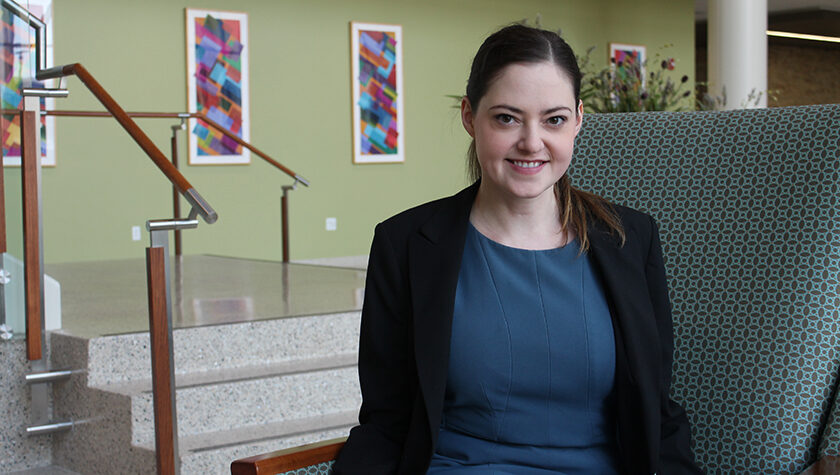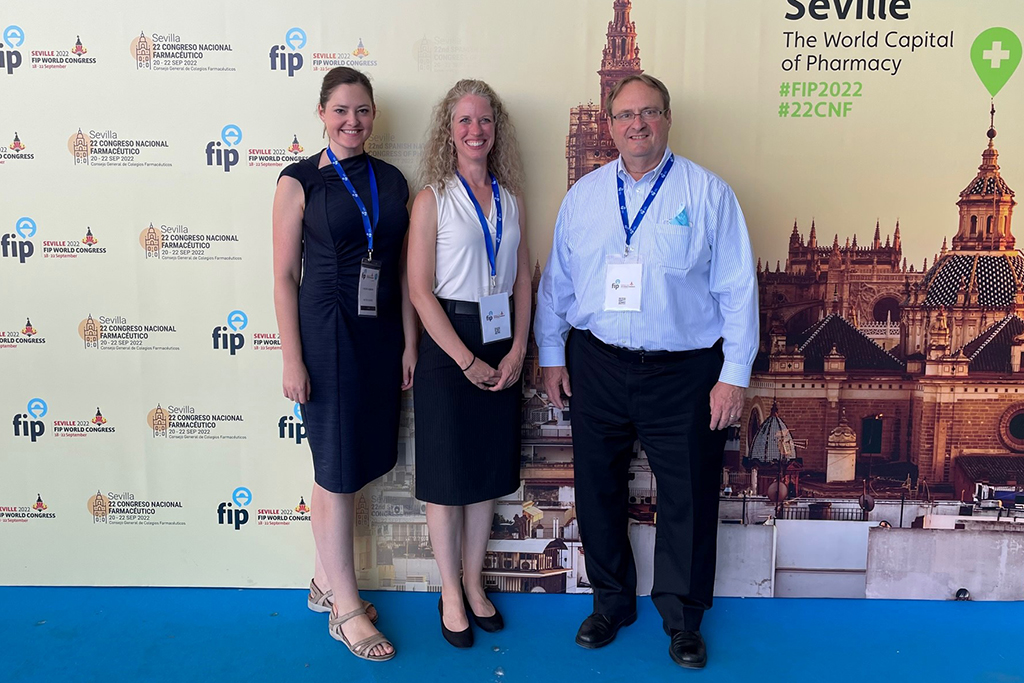
18
March

Laurel Legenza (PharmD ’13) led a years-long health systems improvement project in South Africa to enhance the diagnosis and treatment of C. difficile infection
By Brianna Foth
“To me, global health means uplifting the health of all populations, everywhere,” says Laurel Legenza (PharmD ’13), director of global health at the University of Wisconsin–Madison School of Pharmacy. “For us, global health work isn’t going from here to there. To borrow an analogy from Lori DiPrete Brown, director of the UW’s Global Health Institute: It’s going from here to everywhere.”
For the last seven years, Legenza has been spearheading a project in collaboration with the University of the Western Cape (UWC), in Cape Town, South Africa, to bolster their health system’s timely identification of and response to Clostridioides difficile (C. difficile) infection.
“When I became the School’s Comparative Health Systems Global Pharmacy Fellow in 2015, there was an identified need for antimicrobial stewardship in the Western Cape, and in South Africa,” says Legenza. “As part of my fellowship, we talked to local infectious disease experts, and we came up with a list of potential projects. And then we looked at the available data, and those local experts helped us prioritize C. difficile as a local concern.”
“It’s important for pharmacists to be involved in global health because they can provide medication-specific insights and contribute to designing systems-level interventions to improve health outcomes everywhere.”
—Laurel Legenza
To get a sense of the task ahead of them, Legenza and her team conducted the first epidemiology, management, and outcomes study for C. difficile infection in sub-Saharan Africa, as well as a qualitative study to assess current facilitators and barriers to quality care for patients with C. difficile. What they found surprised them: Not only did C. difficile have a 29 percent in-hospital mortality rate, but they also identified significant knowledge gaps in terms of local providers’ ability to identify, diagnose, and properly treat the infection.
To address those gaps, Legenza and her team designed and implemented an intervention, in the form of a checklist, to serve as a visual aid to help providers better identify and treat C. difficile. The results of that intervention, years in the making, have now been published in Research in Social and Administrative Pharmacy.
“Our lessons learned in Cape Town could provide insights on how to better treat C. difficile in low-resource settings — not just in Cape Town, but anywhere in the world,” says Legenza. “It’s important for pharmacists to be involved in global health because they can provide medication-specific insights and contribute to designing systems-level interventions to improve health outcomes everywhere.”
Addressing local needs
Overgrowth of C. difficile bacteria in the intestinal tract, often spurred by antibiotic use, can cause diarrhea and colitis. It’s a relatively common infection, but it’s one that can lead to severe illness or even death if not quickly identified and treated.
Despite its widespread prevalence among hospitalized patients, before Legenza’s arrival in South Africa, few studies had been done to assess the impact of C. difficile in low-resource settings, such as South Africa’s publicly funded hospitals.
“C. difficile is really understudied in different parts of Africa but has been highly studied in high-resource settings like Europe, the U.S., and Canada,” says Legenza, who is also a UW Institute for Clinical and Translational Research postdoctoral fellow in the School’s Sonderegger Research Center for Improved Medication Outcomes.

“In our baseline epidemiology study, we uncovered that the patients in the hospitals we looked at had a high prevalence of HIV and tuberculosis, and that C. difficile was significantly associated with tuberculosis, which wasn’t previously well-documented,” says Legenza. “Because most of those C. difficile studies before our work were in high-resource settings, the rates of tuberculosis and HIV just wouldn’t have been high enough to show up in a C. difficile study.”
To ensure that her intervention would be maximally effective, Legenza collaborated with local stakeholders and infectious disease leaders and incorporated their feedback, as well as elements of existing successful interventions in local hospitals, into the checklist’s design and the education sessions used to teach providers how to use the checklist.
“As we uncovered more about the project, our goals evolved,” says Legenza. “Broadly, our goal was to collaboratively design a health systems-strengthening project that was informed by the local context. But the reason this project has taken us so long is that we really took our time to understand what the local needs were, and to uncover the local facilitators and barriers.”
Throughout the entire process, including the initial epidemiology and qualitative studies, Legenza was supported by her team of mentors, which includes Renier Coetzee, an associate professor at the UWC School of Public Health, as well as UW–Madison School of Pharmacy Associate Professors Susanne Barnett and Warren Rose, both from the Pharmacy Practice and Translational Research Division.
“Additionally, we collaborated with Nasia Safdar, from the School of Medicine and Public Health, because she is an expert in C. difficile infection,” says Legenza.
Championing an intervention
The checklist intervention was designed as a physical sticker to be applied to the charts of all patients presenting with diarrhea. The idea, Legenza says, is to make providers aware of C. difficile infection as a possibility early in the hospital stay.
“The idea is to trigger an alert that starts with anyone who has diarrhea. The checklist will get added to their chart, and then it triggers a prompt to consider what type of rehydration the patient should get and whether the patient has any risk factors for C. difficile,” says Legenza. “If the result is negative, the checklist ends. But if the patient tests positive, then the physician can confirm appropriate contact precautions are being followed so the infection doesn’t spread in the hospital, stop medications that are contraindicated, and stop any antibiotics that might be making the diarrhea worse. And then finally, they can order the appropriate antibiotic treatment.”
“We listened to the local healthcare providers and leaders, asked questions, and explored what was needed, which led us to discover where there was potential for improvement.”
—Laurel Legenza
Legenza and her team implemented the checklist at three community hospitals in the Western Cape, the second of which demonstrated high uptake and openness to the intervention. The implementation was enthusiastically met at this hospital due to strong preexisting academic affiliations as well as a strong leadership and learning climate consisting of peer champions who were willing to advocate for the intervention.
“Our most recent paper involved analyzing the intervention development process and adaptations to understand the differences in acceptance, uptake, successes, and failures,” says Legenza. “We really dug deep into uncovering what were the implementation strategies that worked well, and what we could do better in the future.”
Due to the intervention’s successful uptake at the second hospital, Legenza and her team focused on that hospital for their data collection. They conducted a retrospective chart review, in which they found that over the course of 90 days after the intervention was implemented, not only did oral rehydration, contact precautions, and the stopping of contraindicated medications increase, but the mortality rate decreased from 29 percent to 14 percent.
“The results are really striking,” says Legenza. “Our findings often get a reaction when I’ve presented them locally and internationally.”
Broadening the scope
Encouraged by the promising results of the intervention, Legenza is now working to implement feedback from the sites, such as adapting the checklist to include additional risk factors for C. difficile and updating the treatment protocol.
“We originally designed the checklist to follow the South African national treatment guidelines,” says Legenza. “Since then, however, our study and other studies have shown that patients should be started on the antibiotic vancomycin, especially if they’re at high risk for poor outcomes, which was the majority of patients included in our study. We actually made a recommendation that vancomycin should be considered first-line for these patients, and that has since been incorporated into the national guideline.”

In addition to improving the checklist, Legenza is now working to design a new “train the trainer” model to help with implementation at future hospitals. For that work, she was recently awarded a research grant from the International Pharmaceutical Federation.
“We’ll train local pharmacy graduate students to help with the implementation, and we’ll do so in collaboration with our colleagues at the University of the Western Cape,” says Legenza. “Two second-year UW–Madison PharmD students are also working with us on the project, which they’re really excited about.”
Though Legenza plans to engage in further research to assess the sustainability and impact of the checklist, she’s also excited to continue sharing the results of her intervention with stakeholders and other healthcare professionals. Recently, she presented at the regional Antimicrobial Stewardship Symposium in Cape Town, and she also plans to communicate the updated checklist across the province of the Western Cape through a province-level memo.
“What I’m most proud of about this project is that we took such a collaborative approach. We listened to the local healthcare providers and leaders, asked questions, and explored what was needed, which led us to discover where there was potential for improvement,” says Legenza. “I hope that patients who are at risk for C. difficile will now be more quickly identified and treated, and that they can have shorter lengths of hospitalization, better quality of life, and better outcomes overall.”






